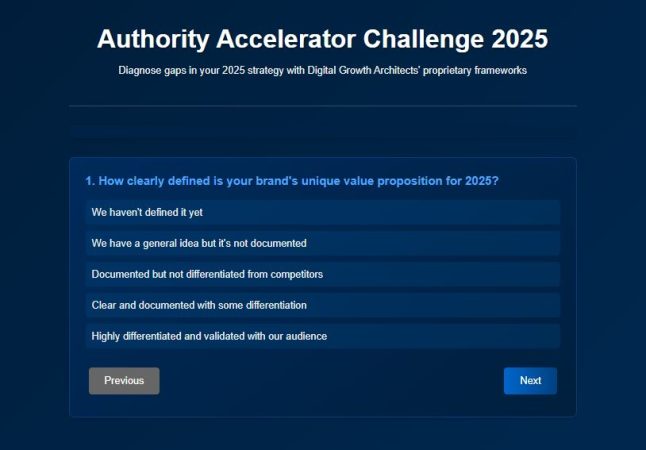
Brand Audits Series “Preparing for Shifts in Consumer Expectations”
Digital Growth Architects & Connects you join forces to deliver Brand Audits Series.
Preparing for Shifts in Consumer Expectations
Preparing for shifts in consumer expectations is essential for marketing managers aiming to maintain brand alignment and ensure cohesive customer experiences.
The rapid evolution of consumer behavior, driven by technological advancements and societal changes, requires brands to remain agile and responsive. To effectively navigate this landscape, marketing managers must prioritize understanding the underlying factors that influence consumer expectations, such as cultural shifts, economic conditions, and advancements in technology.
By analyzing these elements, brands can anticipate changes and adjust their strategies accordingly, ensuring they meet and exceed consumer demands.
One critical aspect of preparing for shifts in consumer expectations is fostering a strong internal brand culture. Employees are often the first point of contact for consumers, and their understanding of brand values and commitment to social responsibility significantly impacts customer perceptions.
Marketing managers should invest in training programs that align employees with the brand’s mission, vision, and values. An engaged workforce not only enhances customer interactions but also serves as a powerful channel for brand advocacy. When employees embody the brand, they can effectively communicate its values to consumers, further reinforcing brand cohesion across all touchpoints.
Social media plays a pivotal role in shaping consumer expectations and perceptions. As platforms continue to evolve, marketing managers must develop strategies that leverage these channels to engage with their audience meaningfully.
Monitoring social media trends and consumer feedback allows brands to adapt quickly to emerging expectations. Additionally, creating content that resonates with target
audiences can enhance brand visibility and foster loyalty. Cross-channel brand strategies should ensure that messaging remains consistent across all platforms, reinforcing brand identity and coherence in the consumer’s journey.
To maintain relevance, brands must also evaluate their brand architecture and portfolio management strategies. As consumer preferences shift, it may become necessary to reassess product offerings and brand positioning. This involves analyzing market trends, consumer feedback, and competitive landscapes to identify potential gaps or opportunities. By aligning the brand portfolio with evolving consumer
expectations, marketing managers can ensure that each brand within the portfolio complements the overall brand strategy.
This alignment enhances customer experiences by providing options that resonate with their values and preferences.
Social responsibility
Lastly, brands must embrace social responsibility as a core component of their identity. Modern consumers increasingly seek brands that demonstrate a commitment to ethical practices and social causes. Marketing managers should proactively communicate their brand’s initiatives and values, establishing transparency and authenticity.
By integrating social responsibility into the core brand strategy, organizations can not only meet consumer expectations but also build lasting relationships based on trust and shared values. This approach ultimately strengthens brand loyalty and positions the brand as a leader in both consumer experience and social impact.
Free eBook | Aligning Brands: Strategies for Cohesive Customer Experiences
[dflip id=”15608″][/dflip]
Enjoyed the reading? Why don’t you step forward and book a session with Digital Growth Architects’team?
This eBook for you to download is a special collaboration between Kevin Blumer and Stephane Metral for Brand Audits Series.
A great way to evaluate where you stand in matters of Branding is to assess your authority level with tools we develop for you. Check this one out.
More article about Tools?












